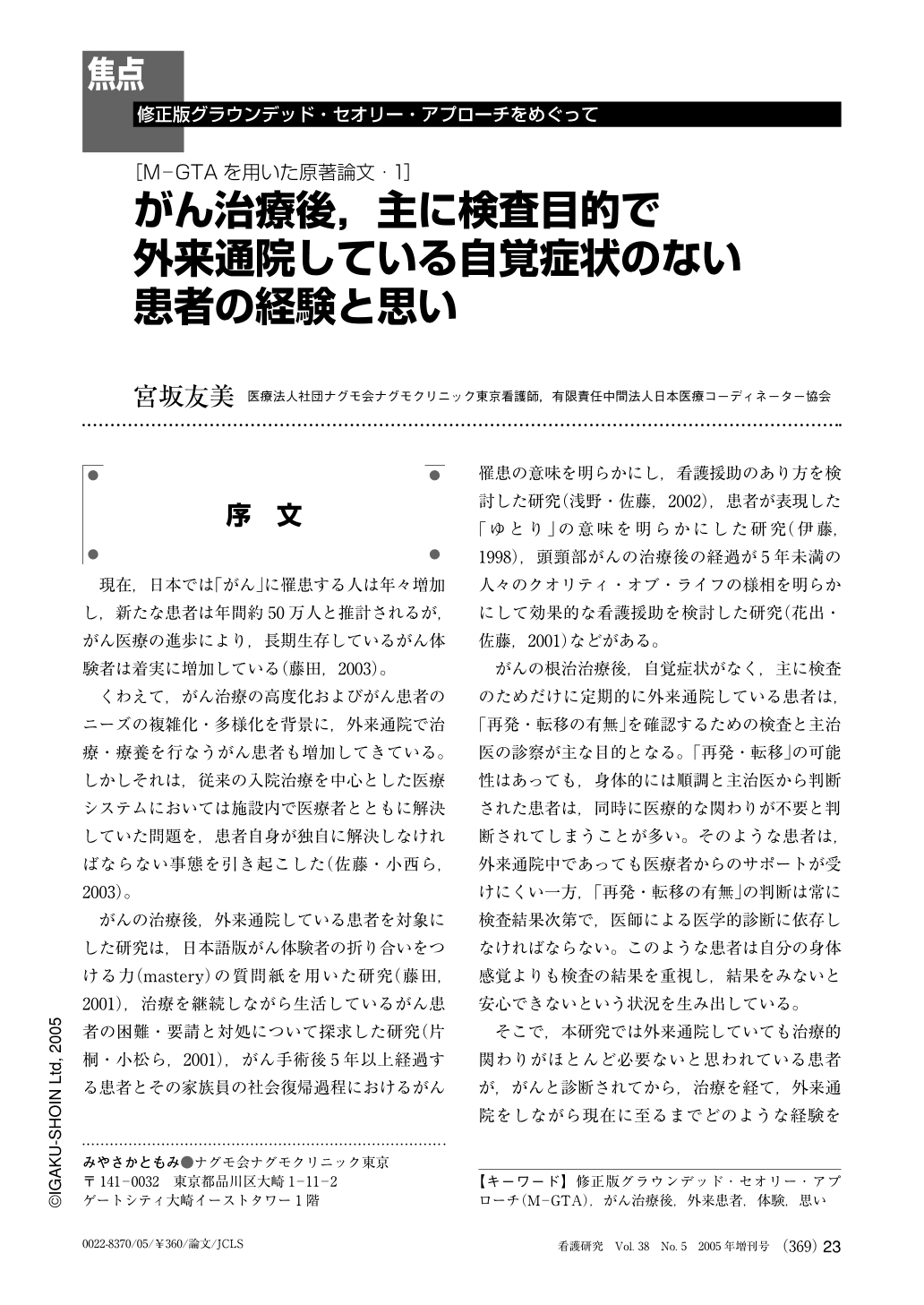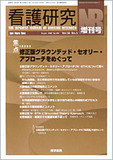Japanese
English
- 有料閲覧
- Abstract 文献概要
- 1ページ目 Look Inside
- サイト内被引用 Cited by
序 文
現在,日本では「がん」に罹患する人は年々増加し,新たな患者は年間約50万人と推計されるが,がん医療の進歩により,長期生存しているがん体験者は着実に増加している(藤田,2003)。
くわえて,がん治療の高度化およびがん患者のニーズの複雑化・多様化を背景に,外来通院で治療・療養を行なうがん患者も増加してきている。しかしそれは,従来の入院治療を中心とした医療システムにおいては施設内で医療者とともに解決していた問題を,患者自身が独自に解決しなければならない事態を引き起こした(佐藤・小西ら,2003)。
がんの治療後,外来通院している患者を対象にした研究は,日本語版がん体験者の折り合いをつける力(mastery)の質問紙を用いた研究(藤田,2001),治療を継続しながら生活しているがん患者の困難・要請と対処について探求した研究(片桐・小松ら,2001),がん手術後5年以上経過する患者とその家族員の社会復帰過程におけるがん罹患の意味を明らかにし,看護援助のあり方を検討した研究(浅野・佐藤,2002),患者が表現した「ゆとり」の意味を明らかにした研究(伊藤,1998),頭頸部がんの治療後の経過が5年未満の人々のクオリティ・オブ・ライフの様相を明らかにして効果的な看護援助を検討した研究(花出・佐藤,2001)などがある。
がんの根治治療後,自覚症状がなく,主に検査のためだけに定期的に外来通院している患者は,「再発・転移の有無」を確認するための検査と主治医の診察が主な目的となる。「再発・転移」の可能性はあっても,身体的には順調と主治医から判断された患者は,同時に医療的な関わりが不要と判断されてしまうことが多い。そのような患者は,外来通院中であっても医療者からのサポートが受けにくい一方,「再発・転移の有無」の判断は常に検査結果次第で,医師による医学的診断に依存しなければならない。このような患者は自分の身体感覚よりも検査の結果を重視し,結果をみないと安心できないという状況を生み出している。
そこで,本研究では外来通院していても治療的関わりがほとんど必要ないと思われている患者が,がんと診断されてから,治療を経て,外来通院をしながら現在に至るまでどのような経験をし,その時々にどのように感じていたかという視点から,当事者たちの思いを明らかにすることを目的とし,その結果を踏まえ医療者ができることについて考察する。
The current research interviewed 8 individuals who were informed that they had no recurrence or metastasis after definitive treatment for cancer (surgery, chemotherapy, etc.) and who periodically visit hospitals for tests (individuals not visiting for treatment of other illnesses) despite having no subjective symptoms. This research analyzed these individuals from the perspective of“what would serve as support”using a Modified Grounded Theory Approach. Results were that the feeling of there is no guarantee that I’m OK was in the portion intersecting the graph of ∞ (infinity), feelings in[the category of feeling helpless]and[the category of wanting to take action]were fluid, and which category one fit into was related to a change in mood and the relationship with one's attending physician. Results suggested that treatment providers not merely follow the course of illness, i.e. whether the cancer affecting the patient has recurred or metastasized, but that they need to recognize the importance of an approach from the perspective of health and prevention of disease and, with attention to a patient's life after surviving strenuous treatment, strive to support the patient from a variety of angles with sentiments of〈deciding to accept things one's self〉and〈putting experience to use〉of cancer survivors.

Copyright © 2005, Igaku-Shoin Ltd. All rights reserved.


